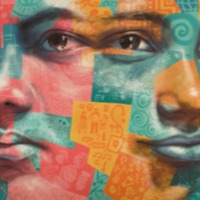
I’m Ahmed Hassan Yehia and I’m from Yemen. I’m 25 years old. This is my story.
The troubles and civil war started in Yemen in 2015. Houthi troops tried to enlist us, so my parents wanted me to go to Egypt because of the war that was going on.
I came to Egypt and stayed for 15 days or so. I found a smuggler who told me he could take me to Italy with my friends. He was friendly at first, he talked to us in a friendly way. We didn’t have money when he came to Egypt, but my friends earned some. A bus picked us up in the 10th district (Cairo). We were 45.
While we were waiting by the roadside, they began treating us in a different way, in a bad way. It took six or seven hours to Baltim. They took us to the beach, and we got on a boat and went out to sea. First, they took one group, then the other. They said the boat would take us to a ship out at sea, but they took us somewhere else. There was a man with a knife who cut me so he could take what I had. I didn’t agree. But what happened happened.
I was cut here and then he took what he had in our pockets. Three people, one with a butcher’s knife, the other with a gun and the third with a knife. Thank God, the Egyptian Coast Guard came and saved us. They took the boat to the coast, where we stayed for almost three hours, being questioned. They told us, you’re clean, there’s nothing on you, you’ll be released. Then the other government officials came and took us to a detention centre in Kafr al-Sheikh.
I went to Sudan and stayed in Port Sudan for two days, then I was smuggled here (Egypt). I came with smugglers. We were on the road for about two weeks from Port Sudan to Aswan. It was a humiliating time. I mean, they took us somewhere in the desert. We stayed there for three days, and it was hard, with no food, and the water was very hot. The smuggler said we were going to the sea, but it turned out to be a trap.
They tortured us. You must pay to get to the sea and there was no sea. It was a trap for us, there was no sea. We were 250 people. They’d take us outside and force us to make phone calls. They put a gun to our heads and demanded USD 3,500. We should pretend we’d already arrived in Malta, near Italy, while in fact we were being held on a farm in the Egyptian desert. We stayed there for a full month.
When our families paid the money, at the end, when all 250 people had paid, then they let us go. They dropped us in the street somewhere. They left us there and said, get the bus. They gave each person 500 Egyptian pounds so we could leave.
Two of them were Yemeni and one was Somali. The one who said, this time it’s on me, I guarantee it. The Yemeni. We trust him because we were like friends. When you’ve broken bread with someone you can’t forget it. I can’t deny what was between me and that man. I trusted him, there was trust between us. I mean, we lived together, you know? That’s why we trusted him and went on the second trip. But the Yemeni, our friend, the one we trusted, he was working with him (the main smuggler).
My family don’t know that I went through this ordeal. They wouldn’t accept that I’d go on tahrib. I went without their knowledge the first time. But when I was detained for two months, they got to know. On the second trip in 2018, my family paid the ransom under threat. They called my family and told them. You have to send us the money, USD 3,500, then we’ll let your son go. Only God knows how my family for the USD 3,500.
They mortgaged our house so they could get us out. The smuggler is bad, this is called human trafficking. He doesn’t care. The most important thing for him is to get his money, people are not important. I wouldn’t advise anyone to trust a smuggler. Don’t throw yourself in harm’s way because they don’t tell the truth. He says things that aren’t true. It’s only a trap to get money. I don’t wish it upon anyone, not my enemy, not my friend, to fall into this trap. To tell you the truth, it’s suicide.
Narrative source Telling the Real Story facilitated by UNHCR
Original Narrative can be found at https://www.tellingtherealstory.org/en/stories/video/yehias-story/









